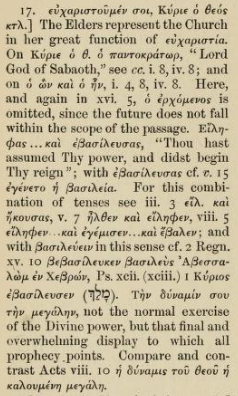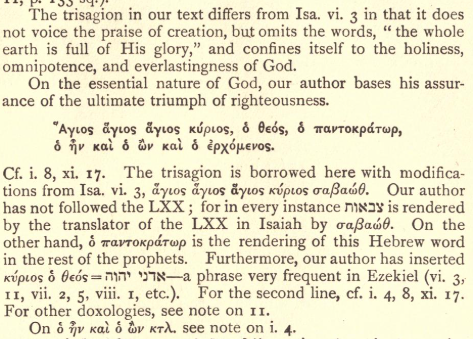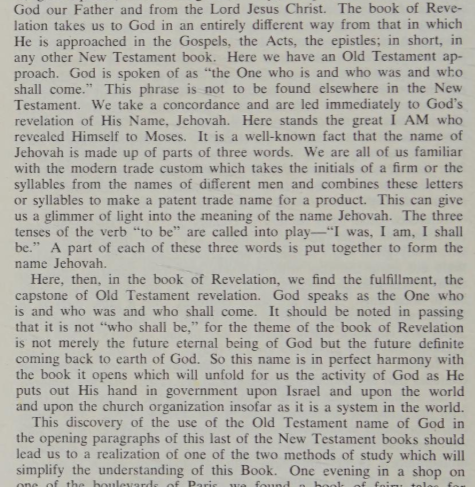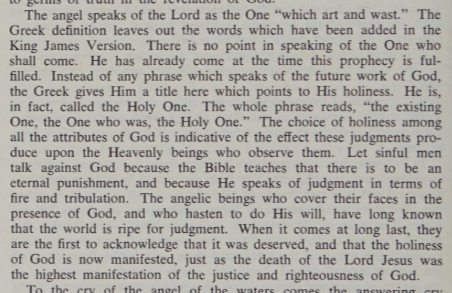Swete
Henry Barclay Swete (1835-1917) was the Regius Professor of Divinity at Cambridge and is known for his 1906 commentary on Revelation, but also (at least by me) for his work on the Septuagint.
Swete provides a chapter on use of the Old Testament in Revelation. Unsurprisingly, he connects Revelation 1:4 to Exodus 3:14. More interesting was his connection between Revelation 16:5 and Psalm 145:17.
At Revelation 1:4, Swete explains the relationship of "the Being One" to Exodus 3:14, and also suggests that the coming of God is the reason for "the Coming One":
At Revelation 11:17, Swete correctly avoids inserting "the coming one":
Likewise, at Revelation 16:5, Swete avoids Beza's substitution. In terms of the word hosios itself, Swete tackles the interesting to me, if seemingly picayune, question of whether it should have the article or not, as well as the more interesting question of whether o hosios should be taken as a vocative, "O Holy One," as many translations now have.
Steele
David Steele, Sr. (1803 – 1887) was a Reformed Presbyterian (aka Covenanter) minister of the "Old Light" variety. His "Notes on the Apocalypse," has been described as "perhaps the best medium-size historicist commentary on the book of Revelation." (source) The only relevant remark he offers at Revelation 16:5 is this: "The eternal Jehovah is recognized as the Author of these judgments" (link to page).
Missler
Dr. Chuck Missler (1934 – 2018) in his commentary on Revelation briefly discusses the textual issue
Here's a transcription:
I heard the angel of the water say thou art righteous O Lord which art and wast and shalt be because thou hast judged thus. The Greek leaves out the "shall be." It's an existing one, who was, and the Holy One," and so forth. There's no point in speaking of the one that as if he shall come that's just that's a translational issue.
I think that Pastor Missler is more or less summarizing whatever commentary he is working from on this matter. It's less a translation issue and more of a text issue, however.
Hendricksen
William Hendricksen, More than Conquerors (1940; London: Tyndale Press, 1962)
Hendricksen does not explicitly discuss the textual issue at Revelation 16:5. However, he explains the non-insertion of "the coming one" at Revelation 11:17:
Observe that in this anthem the Lord is no longer called ‘the One who is and who was and who is to come’, as in 1:8, for He has come. The Church rejoices in the fact that the Lord has reached the zenith of His power and authority, now publicly displayed. The heathen were furious; they had made war with the witnesses, conquered them, killed them, and gloated over their misery (11:7 ff.). But at last God’s wrath became fully revealed, namely, on the day of final judgment which has now arrived. On that same day all those who fear the Lord receive their reward, while the destroyers are destroyed (cf. Mt. 25: 31 ff.).
When it comes to Revelation 1:4, Hendricksen oddly seeks to defend John's grammar by insisting that it is good Greek!
Moffatt's translation has:
Revelation 1:4 John to the seven churches in Asia: grace be to you and peace from HE WHO IS AND WAS AND IS COMING, and from the seven Spirits before his throne,
Revelation 1:8 "I am the alpha and the omega," saith the Lord God, who is and was and is coming, the almighty.
Revelation 4:8 The four living Creatures, each with six wings apiece, are full of eyes all over their bodies and under their wings, and day and night they never cease the chant, "Holy, holy, holy, is the Lord God almighty, who was and is and is coming."
Revelation 11:17 saying, "We thank thee, Lord God almighty, who art and wast, that thou hast assumed thy great power and begun to reign;
Revelation 16:5 Then I heard the angel of the waters cry, "O holy One, who art and wast, just art thou in this thy sentence.
Moreover, Moffatt's translation received a corresponding commentary by Martin Kiddle:
Kiddle
The Moffatt New Testament Commentary, based on The New Translation, by the Rev. Professor James Moffatt, D.D. and under his Editorship, The Revelation of St. John, by Martin Kiddle.
At Revelation 1:4, Kiddle writes (p. 7):
Following usage, John points to the attribute of God which he wishes to stress: HE WHO IS AND WAS AND IS COMING: or, in other words, the Eternal, whose advent into the Empires of Time was so near. (The usual term had been : "He who is and was and shall be.') Similar though more curious testimony to John's extreme reverence for God is borne by the deliberately ungrammatical ' from He. . . .' Even a paraphrase of the name of the unchanging God must be preserved from declension !
Kiddle's "ungrammatical" claim, while it clashes with Hendricksen's, is unsurprising. More surprising is his (seemingly unsupported and wrong) claim that "the usual term had been ... and shall be"(!)
At Revelation 4:8, Kiddle writes: (p. 92):
There is a hint even in chap. iv. of the eschatological emphasis which John is to place on them. Instead of crying out with Isaiah's seraphs :
' Holy, holy, holy, is the Lord of hosts, his majestic splendour fills the whole earth ! '
they chant the trisagion to a God whose majestic splendour is as yet deliberately withheld from the earth ; one who has deliberately limited His realm, so that He must be hymned as 'the coming One,' the Eternal, whose full sovereignty in the universe yet lies in the future : he who is and was and is coming (cf . note on i. 8) .
At Revelation 11:17, Kiddle explains the non-insertion of "the Coming One" on the grounds that he has come (p. 208):
The song of the four and twenty Presbyters (see note on iv. 4) takes up the theme announced by the loud voices. These angelic beings cast aside their royal state to pay homage to the Lord God almighty, who has begun to reign. No longer is He the Lord ' who is and was and is coming ' (i. 8, iv. 8) ; He has come, and the Presbyters now cry : ' Lord God almighty, who art and wast. . . .'
At Revelation 16:5, Kiddle explains the principle of justice behind the punishment, but without comment on the textual issue that has been our focus. Nevertheless, Kiddle provides an interesting parallel to Wisdom (pp. 318-319):
There are no literal seas of blood in the records of history. But what limitless pages of agony and distress ! If we cannot see eye to eye with John over the means by which he imagined God would usher in a new reign of righteousness, if we cannot refrain from protesting that the Creator of men must cast aside His experiment without vengefulness, without taunting men with His omnipotence, without the clamour and demonstration of the seven last plagues, we can at least agree in part with the thought that lies behind the terrible cry of the angel of the waters : ' O holy One . . . just art thou in this thy sentence. They poured out the blood of saints and prophets, and thou hast given them blood to drink ! ' As they deserve ! The underlying thought is that men are to receive punishment appropriate to their crime : experience has an abundant store of examples to prove to whatever nation cares to pay heed that communities do suffer proportionately to their crimes, and that often enough there is a grim and obvious aptness in the ill effect of an ill cause. (For comment on the angel of the waters, see p. 152.) This is a theme which recurs several times in the Book of Wisdom in connexion with idolatry. 'By what things a man sinneth, by these he is punished' (Wisd. xi. 16). In the same chapter we find the probable source of this incident in Revelation. For the author, in pointing out the contrast between the sufferings of the Israelites in the desert and the sufferings of the Egyptians, connects the plague of blood with the impious legislation of Pharaoh :
'When the enemy were troubled with clotted blood instead of a river's ever-flowing fountain, To rebuke the decree for the slaying of babes. Thou gavest them abundant water beyond all hope.'
(Wisd. xi. 6-7.)
Mauro
Philip Mauro, Of Things which Soon Must Come to Pass: a Commentary on the Book of Revelation (1933)
At Revelation 1:4, Mauro writes (pp. 51-52):
1. God is here presented as the eternally self-existent One, the words, "He Who is, and Who was, and Who is to come", being an amplified statement of the ineffable Name of Exodus 3:14. It is there rendered, "I AM THAT I AM" ; but the sense of eternal existence, past and future, is implied in the original Hebrew words.
"The idea of pure, absolute, unchangeable existence, as expressed in the name Jehovah, is quite a practical one. The people of Israel, in asking for His name, were to find in it a pledge and security for what was to be performed by Him, for His wonderful help in the most distressful circumstances ; not what would merely satisfy their metaphysical curiosity. The name Jehovah comprises in itself the fulness of all consolation, mid the treasures thereof are here brought up from their depths and are placed before the eyes of believers, the seer's companions in the Kingdom and patience of Jesus Christ. Against this I Rock of the pure, unchangeable, absolute Being of God, dash all the despairing thoughts of those happy ones who can call] this God their own, as also all the proud thoughts of the world which has Him for its enemy" (Hengstenberg).
Mauro uses the KJV reading of Revelation 16:5 (at p. 466), but does not have any particularly relevant comments there or at Revelation 11:17.
Charles
R.H. Charles, A Critical & Exegetical Commentary on the Book of Revelation, vol. 1 (1-13), 2 (14-22) 1920 in The International Critical Commentary.
Charles, at Revelation 1:4 explains the grammar and meaning of the text (vol. I, pp. 10-11)
At Revelation 4:8, Charles comments on the Old Testament and compares Revelation to the LXX text (vol. I, p. 127)
At Revelation 11:17, Charles explains that "the coming one" is not inserted because it has been fulfilled (vol. I, p. 295):
Charles engages in form criticism of Revelation, and so has moved 16:5b-17 to after 19:4 (vol. II, p. 44):
Thus, Charles final gets to the text later, where he debates the question of whether the text should be vocative (vol. II, p. 123):
You may note that he suggests Trench's work on the relation of dikaios and hosios in Classical Greek.
Elliott
Donald G. Barnhouse, Revelation: an Expository Commentary, God’s Last Word (1971) provides a Reformed and Presbyterian take on the book of Revelation.
At Revelation 1:4, Barnhouse opines (p. 20):
The book of Revelation takes us to God in an entirely different way from that in which He is approached in the Gospels, the Acts, the epistles; in short, in any other New Testament book. Here we have an Old Testament approach. God is spoken of as “the One who is and who was and who shall come.” This phrase is not to be found elsewhere in the New Testament. We take a concordance and are led immediately to God’s revelation of His Name, Jehovah. Here stands the great I AM who revealed Himself to Moses. It is a well-known fact that the name of Jehovah is made up of parts of three words. We are all of us familiar with the modern trade custom which takes the initials of a firm or the syllables from the names of different men and combines these letters or syllables to make a patent trade name for a product. This can give us a glimmer of light into the meaning of the name Jehovah. The three tenses of the verb “to be” are called into play—‘“I was, I am, I shall be.” A part of each of these three words is put together to form the name Jehovah.Here, then, in the book of Revelation, we find the fulfillment, the capstone of Old Testament revelation. God speaks as the One who is and who was and who shall come. It should be noted in passing that it is not “who shall be,” for the theme of the book of Revelation is not merely the future eternal being of God but the future definite coming back to earth of God. So this name is in perfect harmony with the book it opens which will unfold for us the activity of God as He puts out His hand in government upon Israel and upon the world and upon the church organization insofar as it is a system in the world.
This discovery of the use of the Old Testament name of God in the opening paragraphs of this last of the New Testament books should lead us to a realization of one of the two methods of study which will simplify the understanding of this Book.
It is interesting to me that although Barnhouse reads "the coming one" as "who shall come," he is insistent on distinguishing the coming of God from "shall be."
At Revelation 11:17, Barnhouse points out that the "is to come" in the KJV is the result of copyist error, and its absence in the earliest manuscripts is proof of Scripture's accuracy (p. 209):
“We give thanks to Thee, O Lord God, the Almighty, the One who is and who was, because Thou hast taken Thy great power and dost reign.” It should be noted that the clause “and art to come” is not in the original. It was probably added by come copyist and thus crept into some of the later “manuscripts, but the best authorities omit it. And certainly it should be omitted. Its absence in the oldest manuscripts is another proof of the detailed accuracy of the whole of the Bible revelation.
The angel speaks of the Lord as the One “which art and wast.” The Greek definition leaves out the words which have been added in the King James Version. There is no point in speaking of the One who shall come. He has already come at the time this prophecy is fulfilled. Instead of any phrase which speaks of the future work of God, the Greek gives Him a title here which points to His holiness. He is, in fact, called the Holy One. The whole phrase reads, “the existing One, the One who was, the Holy One.” The choice of holiness among all the attributes of God is indicative of the effect these judgments produce upon the Heavenly beings who observe them. Let sinful men talk against God because the Bible teaches that there is to be an eternal punishment, and because He speaks of judgment in terms of fire and tribulation. The angelic beings who cover their faces in the presence of God, and who hasten to do His will, have long known that the world is ripe for judgment. When it comes at long last, they are the first to acknowledge that it was deserved, and that the holiness of God is now manifested, just as the death of the Lord Jesus was the highest manifestation of the justice and righteousness of God.
Barnhouse's appeal to "The Greek definition," is an interesting way of saying that the Greek manuscripts have different words from the KJV.
Consulted without finding relevant material
C. J. Vaughan, Lectures on the Revelation of St. John (1861 1st ed., 1882 2nd ed.)
Not consulted/reviewed
Rogers, George – Lectures on the Book of Revelation (1844) Four volumes, but I could not locate an online copy.
Barclay, William – The Revelation of John, vol. 1 (1-5), 2 (6-22) in The Daily Bible Study Series rev. ed. (1961; Westminster Press, 1976)




























No comments:
Post a Comment